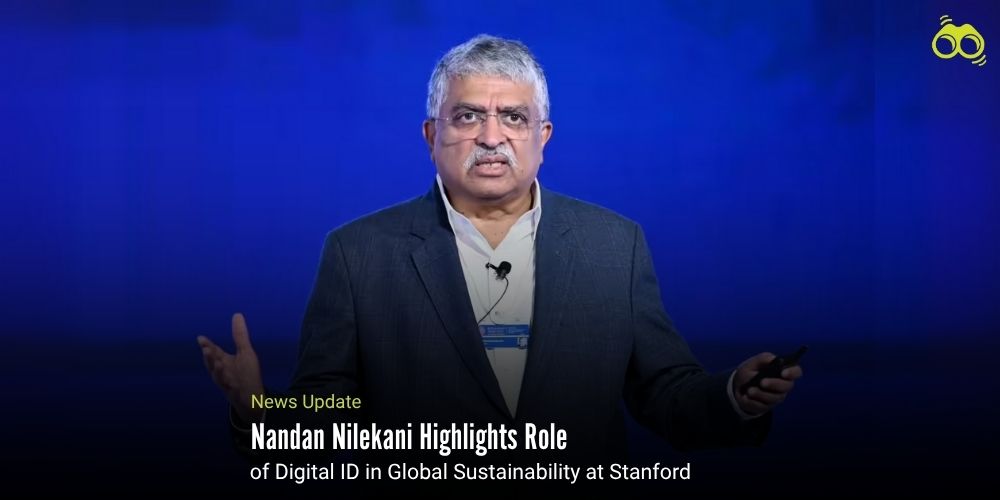Stanford Lecture: Nilekani Urges Global Adoption of India’s Digital Infrastructure
India’s Digital Transformation Offers Roadmap for Global Inclusion, Says Nilekani
Countries around the world are increasingly grappling with the challenge of building sustainable economies and enhancing the well-being of their citizens amidst shifting climates, evolving political landscapes, and rapid technological advancements. In response to these pressing issues, Nandan Nilekani, founding chairman of the Unique Identification Authority of India (UIDAI) and co-founder of Infosys, recently addressed the transformative potential of digital identification and public infrastructure during a lecture at the Stanford Doerr School of Sustainability on 27 May.
Speaking as part of the Dean’s Lecture Series, which convenes global thought leaders to explore key sustainability challenges, Nilekani highlighted the role of UIDAI in digitising India’s economy for its 1.4 billion citizens. He emphasised how the Aadhaar biometric ID system and the Unified Payments Interface (UPI) have become foundational elements of India’s digital public infrastructure. Dean Arun Majumdar praised Nilekani as a key architect of modern India, noting that he is now applying his vision and expertise to tackle global sustainability challenges.
Nilekani pointed out that, historically, the absence of formal identification, such as birth certificates or driving licences, had excluded millions from essential services, banking access, and legal recognition. Digital ID systems, he explained, are a powerful remedy to this inequity. By enabling over 750 million people to perform secure, fraud-free transactions, platforms like Aadhaar and UPI have spurred inclusive economic growth, even in rural and underserved areas. He gave concrete examples, such as street vendors using digital payments to protect earnings from theft and farmers securing loans through Aadhaar-linked services.
He further explained that India’s digital systems are purposefully designed for universal accessibility, regardless of smartphone ownership. These platforms, he said, are built on open architecture, regulatory coordination, and interoperability, ensuring users can transact smoothly across various applications, which is essential for scaling and integration. Moreover, Nilekani highlighted the contribution of a government-backed cloud platform developed by the Ministry of Electronics and Information Technology. This platform securely holds key documents, including licences, vaccination records, educational certificates, and ID cards. At present, it serves more than 500 million people and manages close to 9 billion digital records.
In his capacity as co-chair of the G20 taskforce on Digital Public Infrastructure, Nilekani laid out a vision for scaling India’s DPI model globally. He noted that the G20, encompassing 19 countries along with the European and African Unions, represents the world’s largest economies and plays a vital role in driving inclusive growth. He argued that DPI, which combines digital identity with real-time payments, offers an efficient model for countries seeking to leapfrog traditional infrastructure constraints. He cited Estonia and Nigeria as examples of countries already adopting similar systems and predicted wider global uptake, particularly in financially and infrastructurally constrained environments. According to him, scalability and cost-efficiency are the defining features that make DPI a powerful solution for low-income nations.
During a panel discussion with Stanford Vice Provost David Studdert and Dean Majumdar, Nilekani expanded on DPI’s potential to address global challenges. He spoke about its application in managing health records, supporting displaced populations such as climate refugees, and fortifying resilience against cyber threats and corruption. He also introduced an emerging initiative, DPI Climate, that seeks to integrate digital systems with clean energy solutions. One component of this initiative includes a decentralised energy grid, where individuals with solar panels and storage systems can sell surplus energy back into the grid, fostering a more participatory and sustainable energy economy.
In closing, Nilekani asserted that transformative societal change hinges on scale, strategic foresight, and inclusivity. Citing India’s digital achievements, he reaffirmed the nation’s commitment to sharing its DPI model with the global community.
Editor’s Note:
Nandan Nilekani’s recent lecture at Stanford serves as a powerful reminder of how digital innovation can be used to solve real-world challenges. His work with Aadhaar and UPI, developed under the Unique Identification Authority of India (UIDAI), has helped millions of people gain access to services they were once excluded from, such as banking, healthcare, and education. By providing a secure and inclusive digital identity, these systems have supported economic growth and improved lives across India, especially in remote and underserved areas. What makes this story even more important is Nilekani’s focus on sharing India’s digital public infrastructure model with the rest of the world. As countries face growing climate, economic, and political pressures, his vision offers a roadmap for using simple, scalable technology to build more equal and resilient societies.
According to Skoobuzz, it is clear that digital systems, when designed with care and accessibility in mind, can play a key role in building a more sustainable future.














0 Comments (Please Login To Continue)